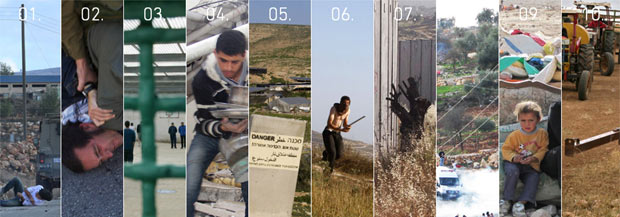B'Tselem's annual report on human rights in the Occupied Territories-2011
 Friday, April 6, 2012 at 10:37PM
Friday, April 6, 2012 at 10:37PM The annual report surveys the broad spectrum of issues regarding the Israeli authorities' human rights record in the West Bank and Gaza Strip over the past year, the 44th year of the Israeli occupation. An interactive version of the report is available online and distributed through social media. The report documents a sharp increase in the number of uninvolved Palestinians killed by the Israeli security forces in the Gaza Strip in 2011. There was also an increase in the number of Israeli civilians killed by Palestinians, compared to 2010.

Preface
Throughout the year BʹTselem conducts in‐depth research and produces publications regarding specific human rights issues. This publication gives an overview of the broad spectrum of issues regarding Israelʹs human rights performance in the West Bank and Gaza Strip over the past year. It is an opportunity to take a step back and look at the big picture.
The picture is harsh – not because of dramatic events or a sudden deterioration, but precisely because of the routine. This year, we enter the 45th year since Israel occupied the West Bank and Gaza Strip. What was supposed to be a temporary situation appears firmly entrenched with no change in sight.
In the West Bank, two and a half million Palestinians live under Israeli military occupation while settlers live in enclaves of Israeli law within the same territory. Individual acts of violence by extremist settlers periodically capture the headlines, and discriminatory and inadequate law enforcement is indeed a concern. However, the major human rights violations result from the settlements: their extensive exploitation of land and water, the massive military presence to protect them, the road network paved to serve them and the invasive route of the Separation Barrier, which was largely dictated by the settlements. Israeli civilians living in the West Bank are also subject to violence. This year, five members of the Fogel family were shot and stabbed to death in their home in the Itamar settlement, and a father and his infant son were killed when their car crashed after rocks were thrown by Palestinians.
In the Gaza Strip, some one and a half million Palestinians are almost completely isolated from the outside world. While people can now leave Gaza through Egypt, they cannot travel to the West Bank, with harsh implications for family ties, the economy and educational opportunities. Israel fully controls the movement of goods. It allows import of humanitarian aid and consumer goods, however raw materials for construction, industry and agriculture are much more limited, and exports are miniscule. As a result, most Gazans remain dependent on humanitarian aid rather than being able to support themselves as they did previously.Human rights are universal; every individual has the same rights and all authorities must be held to the same standards. As an Israeli organization, BʹTselem devotes most of its efforts to monitoring our own government and military. On the Palestinian side, there are several courageous and credible Palestinian organizations monitoring the human rights performance of the Palestinian Authority in the West Bank and the Hamas government in the Gaza Strip.
Human rights violations are inherent in a military occupation and the protracted nature of Israelʹs occupation only exacerbates human rights violations. Our job at BʹTselem is to ensure the fullest respect for human rights in the present circumstances, but it is clear that as long as the occupation continues, Palestinians will never fully enjoy their rights. By the same token, an erosion of the Israeli democracy is also inevitable in a situation of prolonged occupation. Israel controls the fate of millions of people who have no part in the democratic system. This is a dangerous situation for any democracy, and highlights the importance of watchdog groups on government and military behavior in this context.
And yet, these watchdogs have come under increasing attack recently. The Israeli government has supported a series of measures against democratic institutions and critics of government policy. Some of these proposals specifically target human rights organizations like BʹTselem, focusing on our sources of funding.
Such attacks only demonstrate the importance of our work. I am so proud to be part of BʹTselem, a vital part of Israeli civil society that in spite of the many challenges works tenaciously to safeguard human rights on the ground. It is especially gratifying to know that we are part of a community of Israelis, Palestinians and people around the world who share our vision of a future where all Israelis and Palestinians will live in safety and dignity. I am confident that ultimately, working together, we will make this vision a reality.
Jessica Montell Executive Director BʹTselem
 APJP |
APJP |  Post a Comment |
Post a Comment |